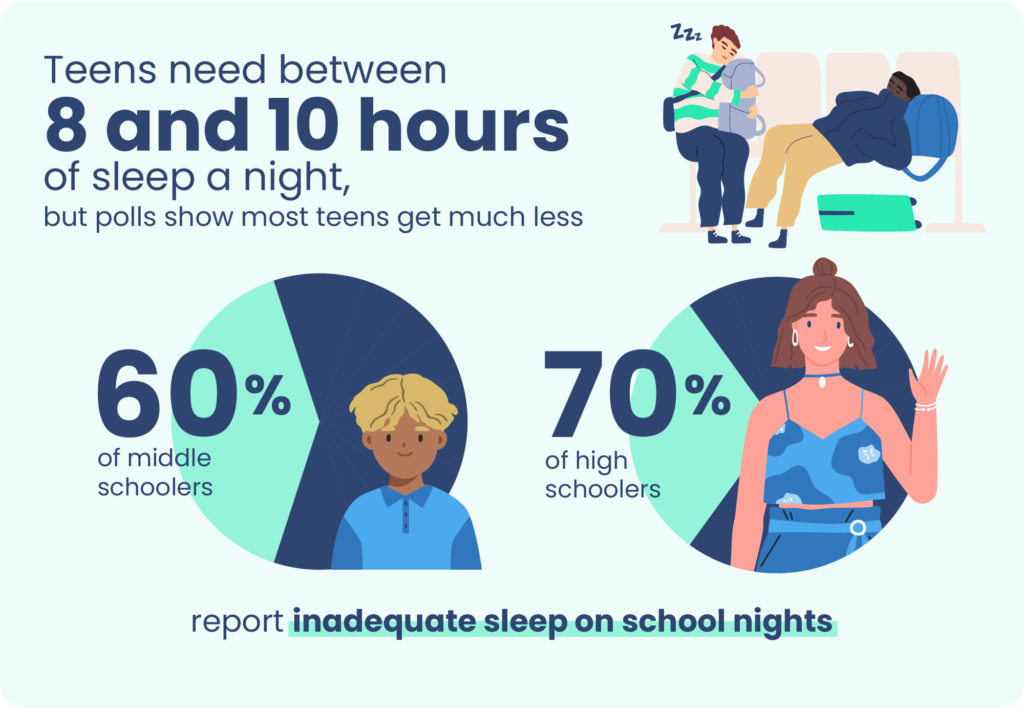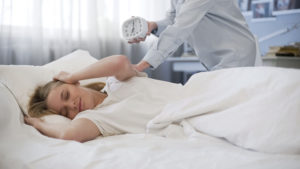Teens and Sleep
An overview of why teens face unique sleep challenges and tips to help them sleep better
- Teens need 8-10 hours of sleep per night for their well-being.
- Teens often have a natural tendency to stay up late due to their changing biological clocks.
- Obligations like early school start times, homework, extracurriculars, and social activities can make it hard for teens to get enough sleep.
- Good sleep hygiene, limited screen time, reduced caffeine, and a consistent sleep routine can help improve teen sleep quality.
Sleep is essential for teenagers because it plays an important role in their physical and mental development. Most teens should get between 8 and 10 hours of sleep per night. Unfortunately, research indicates that many teens get far less sleep than they need.
Teens face numerous challenges to getting consistent, restorative sleep. Recognizing those challenges helps teens and their caregivers make a plan so that teens get the sleep they need.
How Many Hours of Sleep Does a Teenager Need?
Experts recommend that teens between the ages of 13 and 18 get 8 to 10 hours of sleep per night. But this recommendation changes for preteens and adult teenagers .
| Age group | Age range | Recommended hours of sleep per 24 hours |
|---|---|---|
| School-age | 6-12 years | 9-12 hours |
| Teen | 13-18 years | 8-10 hours |
| Adult | 18 years and older | 7 hours or more |
Every teenager is different, though, and some teens need more than the recommended amount of sleep per night while others may require less.
Looking to improve your sleep? Try upgrading your mattress.
Why Is Sleep Important for Teens?
Sleep is vital for people of any age. But especially in teens, profound mental, physical, social, and emotional development requires quality sleep.
Thinking and Academic Achievement
Sleep benefits the brain and promotes attention, memory, and analytical thought. It makes thinking sharper, recognizing the most important information to consolidate learning. Sleep also facilitates expansive thinking that can spur creativity. Whether studying for a test, learning an instrument, or acquiring job skills, sleep is essential for teens.
Given the importance of sleep for brain function, it is easy to see why teens who do not get enough sleep tend to suffer from excessive drowsiness and lack of attention that can harm their academic performance.
Emotional Health
Most people have experienced how lack of sleep can affect mood, causing irritability and exaggerated emotional reactions. Over time, the consequences can be even greater for teens who are adapting to more independence, responsibility, and new social relationships.
Prolonged sleep loss may negatively affect emotional development , increasing risks for interpersonal conflict as well as more serious mental health problems.
Sleep-deprived teens are more likely to report anxiety, depression, and suicidal thoughts and behaviors. Improving sleep in adolescents may play a role in preventing and managing these mental health conditions.

Physical Health and Development
Sleep contributes to the effective function of virtually every system of the body. It empowers the immune system, helps regulate hormones, and enables muscle and tissue recovery.
Substantial physical development happens during adolescence, which can be negatively affected by a lack of sleep. For example, researchers have found that adolescents who fail to get enough sleep have a troubling metabolic profile , evaluated through blood pressure, cholesterol levels, and other factors. These findings may put them at higher risk of diabetes and long-term cardiovascular problems.
Decision-Making and Risky Behavior
Sleep deprivation can affect the development of the frontal lobe, a part of the brain that is critical to control impulsive behavior. Not surprisingly, numerous studies have found that teens who do not get enough sleep are more likely to engage in high-risk behaviors like drunk driving, texting while driving, riding a bicycle without a helmet, and failing to use a seatbelt. Drug and alcohol use, smoking, risky sexual behavior, fighting, and carrying a weapon are also more common in teens who get too little sleep.
Behavioral problems can have widespread effects on a teenager’s life, putting their safety in jeopardy, harming their academic performance, and sometimes damaging their relationships with family and friends.
Accidents and Injuries
Insufficient sleep in teens can make them prone to accidental injury and even death. Of particular concern is an elevated risk of accidents as a result of drowsy driving. Studies have found that sleep deprivation can reduce reaction times with an effect similar to that of significant alcohol consumption. In teens, the impact of drowsy driving can be amplified by a lack of driving experience and a higher rate of distracted driving.
Are Teens in America Getting Enough Sleep?
By almost all accounts, many teenagers in America are not getting the recommended 8 to 10 hours of sleep per night. Around 6 out of 10 middle schoolers and 7 out of 10 high schoolers do not get enough sleep on school nights.

Insufficient sleep has been found to be higher among girls and people assigned female at birth. Older teens report getting less sleep than younger adolescents. Surveys have also found that teens who identify as Black, Asian, or multiracial have the highest rates of sleeping less than eight hours per night.
Why Is It Hard for Teens to Get Good Sleep?
There is not one specific reason for sleep insufficiency among teens. Instead, several factors contribute to this problem, and these factors may vary from teenager to teenager.
Delayed Sleep Schedule and School Start Times
Adolescents develop a strong tendency toward being a “night owl,” staying up later at night and sleeping longer into the morning. Experts believe this is a two-fold biological impulse affecting the circadian rhythm and sleep-wake cycle of teens.
First, teens have a sleep drive that builds more slowly, which means they do not start to feel tired until later in the evening. Second, the body starts producing melatonin later in the day, which is the hormone that helps promote sleep.
If allowed to sleep on their own schedule, many teens would get eight hours or more per night, sleeping from 11 p.m. or midnight until 8 a.m. or 9 a.m., but school start times in most school districts force teens to wake up much earlier in the morning. Because of the biological delay in their sleep-wake cycle, many teens simply are not able to fall asleep early enough to get eight or more hours of sleep and still arrive at school on time.
With reduced sleep on weekdays, teens may try to catch up by sleeping in on the weekend, but this can exacerbate their delayed sleep schedule and inconsistent nightly rest.
Time Demands
Many teenagers have a jam-packed weekly schedule. School assignments, work obligations, household chores, social life, community activities, and sports are just some of the things that can require their time and attention.
With so much to try to fit into each day, many teens do not allocate sufficient time for sleep. They may stay up late during the week to finish homework or during the weekend when hanging out with friends, both of which can reinforce their night owl schedule.
Additionally, pressure to succeed while managing these extensive commitments can be stressful, and stress has been known to contribute to sleeping problems and insomnia.
Use of Electronic Devices
Electronic devices like cell phones and tablets are ubiquitous, and research has found that 89% or more of teens keep at least one device in their bedroom at night.
Screen time late into the evening can contribute to sleeping problems. Using these devices can be stimulating, and incoming notifications can disrupt sleep. Evidence also points to suppressed melatonin production from exposure to the light from smartphones.
Sleep Disorders
Some teens have poor sleep because of an underlying sleep disorder. Adolescents can be affected by obstructive sleep apnea (OSA), which causes repeated pauses in breathing during sleep. OSA frequently causes fragmented sleep and excessive daytime sleepiness.
Though less common, teens can have sleep disorders like restless legs syndrome, which involves a strong urge to move the limbs when lying down, or narcolepsy, which is a disorder affecting the sleep-wake cycle.
Mental Health Conditions
Mental health conditions like anxiety and depression can be a challenge to quality sleep in teens as well as adults. Insufficient sleep can contribute to these conditions as well, creating a bidirectional relationship that can worsen both sleep and emotional wellness.
Neurodevelopmental Disorders
Neurodevelopmental disorders, such as attention-deficit/hyperactivity disorder (ADHD) and autism spectrum disorder , can make it harder for teens to sleep well. Lack of sleep may also contribute to more pronounced symptoms of these conditions.
How Can Teens Get Better Sleep?
Teens who are having sleep problems should start by talking with their doctor about how much sleep they are getting and how it impacts their daily life. Their pediatrician can work to identify any underlying causes and craft the most appropriate and tailored treatment.
Depending on the cause of sleep problems, medications may be considered; however, in most cases, treatment with medications isn’t necessary for teens to get better sleep.
A beneficial step is for teens to review and improve their sleep hygiene, which includes their sleep environment and habits. Some healthy sleep tips that can help in this process include:
- Budgeting eight hours of sleep into your daily schedule and keeping that same schedule on both weekdays and weekends.
- Creating a consistent pre-bed routine to help with relaxation and falling asleep fast.
- Avoiding caffeine and energy drinks, especially in the afternoon and evening.
- Putting away electronic devices for at least a half-hour before bed and keeping them on silent mode to avoid checking them during the night.
- Setting up your bed with a supportive mattress that’s the best mattress for you. And don’t forget to bring your best pillow.
- Keeping your bedroom cool, dark, and quiet.
Sleep hygiene modifications may be included in cognitive behavioral therapy for insomnia (CBT-I), a form of talk therapy for sleeping problems that has demonstrated effectiveness in adults and may be helpful to teens. CBT-I works by reshaping negative ideas and thoughts about sleep and implementing practical steps for better sleep routines.
How Can Parents Help Teens Get Better Sleep?
For many parents and caregivers, a first step is asking their teenage children about their sleep. Encourage teens to see a doctor while also working with them to make gradual sleep hygiene improvements. Some research has found that teens whose parents set a firm bedtime get more sleep and have less daytime drowsiness .
Another avenue for caregivers is advocating for later school start times with their local school district. A number of districts have delayed school start times and seen benefits such as increased attendance, improved academic performances, and fewer car accidents involving students.
Parents and caregivers can also work with their teens to avoid overscheduling and balance commitments that can generate stress with maintaining adequate time for sleep.
References
13 Sources
-
Paruthi, S., Brooks, L. J., D’Ambrosio, C., Hall, W. A., Kotagal, S., Lloyd, R. M., Malow, B. A., Maski, K., Nichols, C., Quan, S. F., Rosen, C. L., Troester, M. M., & Wise, M. S. (2016). Consensus statement of the American Academy of Sleep Medicine on the recommended amount of sleep for healthy children: Methodology and discussion. Journal of Clinical Sleep Medicine, 12(11), 1549–1561.
https://pubmed.ncbi.nlm.nih.gov/27707447/ -
Sio, U. N., Monaghan, P., & Ormerod, T. (2013). Sleep on it, but only if it is difficult: effects of sleep on problem solving. Memory & cognition, 41(2), 159–166.
http://link.springer.com/10.3758/s13421-012-0256-7 -
Perez-Lloret, S., Videla, A. J., Richaudeau, A., Vigo, D., Rossi, M., Cardinali, D. P., & Perez-Chada, D. (2013). A multi-step pathway connecting short sleep duration to daytime somnolence, reduced attention, and poor academic performance: An exploratory cross-sectional study in teenagers. Journal of Clinical Sleep Medicine, 9(5), 469–473.
https://pubmed.ncbi.nlm.nih.gov/23674938/ -
McMakin, D. L., Dahl, R. E., Buysse, D. J., Cousins, J. C., Forbes, E. E., Silk, J. S., Siegle, G. J., & Franzen, P. L. (2016). The impact of experimental sleep restriction on affective functioning in social and nonsocial contexts among adolescents. Journal of child psychology and psychiatry, and allied disciplines, 57(9), 1027–1037.
https://onlinelibrary.wiley.com/doi/10.1111/jcpp.12568 -
Roberts, R. E., & Duong, H. T. (2014). The prospective association between sleep deprivation and depression among adolescents. Sleep, 37(2), 239–244.
https://pubmed.ncbi.nlm.nih.gov/24497652/ -
Cespedes Feliciano, E. M., Quante, M., Rifas-Shiman, S. L., Redline, S., Oken, E., & Taveras, E. M. (2018). Objective Sleep Characteristics and Cardiometabolic Health in Young Adolescents. Pediatrics, 142(1), e20174085.
https://pubmed.ncbi.nlm.nih.gov/29907703/ -
Wheaton, A. G., Olsen, E. O., Miller, G. F., & Croft, J. B. (2016). Sleep duration and injury-related risk behaviors among high school students–United States, 2007-2013. Morbidity and Mortality Weekly Report, 65(13), 337–341.
https://www.cdc.gov/mmwr/volumes/65/wr/mm6513a1.htm -
Meldrum, R. C., & Restivo, E. (2014). The behavioral and health consequences of sleep deprivation among U.S. high school students: relative deprivation matters. Preventive medicine, 63, 24–28.
https://linkinghub.elsevier.com/retrieve/pii/S0091743514000929 -
Division of Population Health, National Center for Chronic Disease Prevention and Health Promotion. (2020, September 10). Sleep in high school students. Centers for Disease Control and Prevention., Retrieved February 13, 2023, from
https://www.cdc.gov/sleep/data-research/facts-stats/high-school-students-sleep-facts-and-stats.html -
Carter, B., Rees, P., Hale, L., Bhattacharjee, D., & Paradkar, M. S. (2016). Association Between Portable Screen-Based Media Device Access or Use and Sleep Outcomes: A Systematic Review and Meta-analysis. JAMA pediatrics, 170(12), 1202–1208.
https://pubmed.ncbi.nlm.nih.gov/27802500/ -
Devnani, P. A., & Hegde, A. U. (2015). Autism and sleep disorders. Journal of pediatric neurosciences, 10(4), 304–307.
https://www.ncbi.nlm.nih.gov/pmc/articles/PMC4770638/ -
Short, M. A., Gradisar, M., Wright, H., Lack, L. C., Dohnt, H., & Carskadon, M. A. (2011). Time for bed: parent-set bedtimes associated with improved sleep and daytime functioning in adolescents. Sleep, 34(6), 797–800.
https://pubmed.ncbi.nlm.nih.gov/21629368/ -
The Children, Youth, & Families Office of the American Psychological Association (2014). Later school start times promote adolescent well-being., Retrieved February 13, 2023, from
https://www.apa.org/pi/families/resources/school-start-times.pdf






